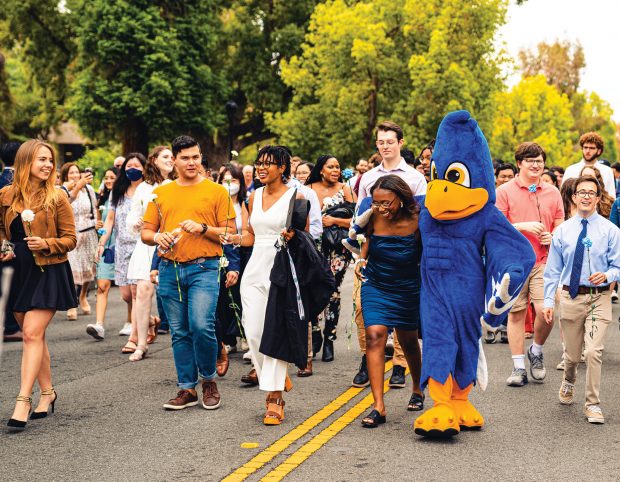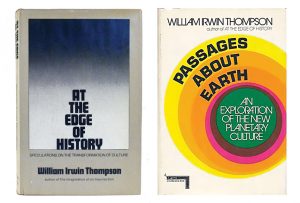Kudos to the Pandemic Graduates
I came home from summer vacation to find the Summer 2022 edition of PCM had arrived. What a joyful read! I love the beautiful graduation photos for all three classes. They fought hard these past few years and I’m overjoyed to see them celebrating together.
I admire the members of the classes of 2020, 2021 and 2022 so much. While they couldn’t spend their years together the way anyone would have imagined, they’re linked in a new and different way. I think they’ll find power in remembering what they’ve overcome as individuals, and together.

Recent graduates make the traditional exit through the College Gates during the May 2022 delayed Commencement celebrations for the pandemic Classes of 2020 and 2021.
I also loved the “Heart to Heart” article with my classmate Roxanne Ruzicka Maas ’94 and Elisa Louizos ’96. They didn’t just survive something frightening. They chose to renew their friendship, and renew their commitments to living with love and meaning.
I always feel a little restless in the fall, like I should be starting a new academic pursuit. So I’ll take this renewal and inspiration with me as I head back to work, and take my daughter Bailey to first grade.
—Christina Caldwell Lobo ’94
Ballwin, Missouri
Remembering William Irwin Thompson ’62
I noted with sadness the passing of William Irwin Thompson ’62 (Spring 2022). Thompson was one of the formative writers of my early 20s. I read two of his books—At the Edge of History and Passages About Earth—before I even knew I would be transferring to Pomona, which I eventually did in fall 1975. Those books offered a heady brew of history, philosophy, religion, literature, art and anthropology, all in the service of nudging what Thompson saw as a nascent planetary culture into being.
For someone coming of age in the early ’70s, they offered a vision of culture more grounded and hopeful than the unhinged and rapacious one we were instead coming to inhabit. I have continued to collect and read his writings over the years, and while my older, more pessimistic self may not have found them quite so intoxicating, they still provoked and stimulated as well as introduced me to writers (Francisco Varela, James Lovelock, Lynn Margulis, Evan Thompson) and ideas (embodied minds, Gaia hypothesis) that at the time were outside the mainstream.
After I learned of Thompson’s death, I ran across an online interview he gave in 2008. This passage caught my eye: “And I didn’t like high school, I had A’s and F’s. So I couldn’t get into UCLA or a conventional school, but I was able to talk my way into Pomona as a maverick. The professor said, ‘We’re allowed one oddball a year. I will make you my oddball for this year if you go back and finish your high school diploma.’” I thought, Hey, that’s me! I too had a checkered high school record and a vexed relation with educational institutions generally. My first semester, Chemistry Professor Wayne Steinmetz told me I was the very last applicant the admissions committee decided on, hinting that his doubts persisted. But I stayed on despite having my own doubts about Pomona that first year. And though my life has followed a very different path than Thompson’s, I’m grateful Pomona saw fit to take a chance on us both and that it was the kind of place that offered us the means to find our footing and flourish in our own distinct ways.
—Rick Penticoff ’78
Moscow, Idaho

P.S. Your notice makes it appear as if At the Edge of History and Passages About Earth are one book. They are two—Edge was published in 1971; Passages in 1974.
Pomona’s Contributions to Diplomacy
I was thrilled to read in the summer issue “Partners in Prague” by Doug Morrow ’01 and Erik Black ’95, relating their efforts in Prague and elsewhere to “share and strengthen” our democratic values there. It is heartening to read that these two Pomona grads recognize the importance of constant vigilance in this respect. Even in our own country, we need reminders of the significance of these values. Thank you for publishing their story.
—Jane Barnes ’58
Julian, California
